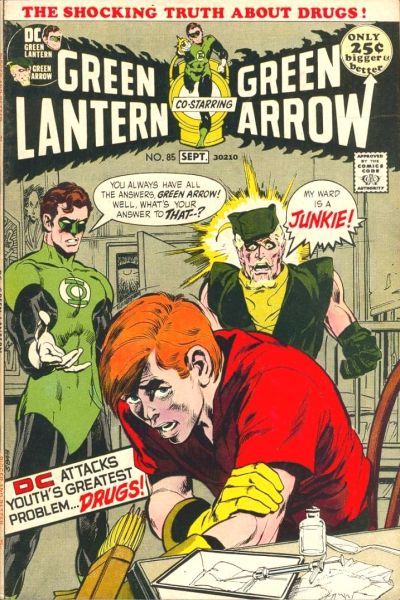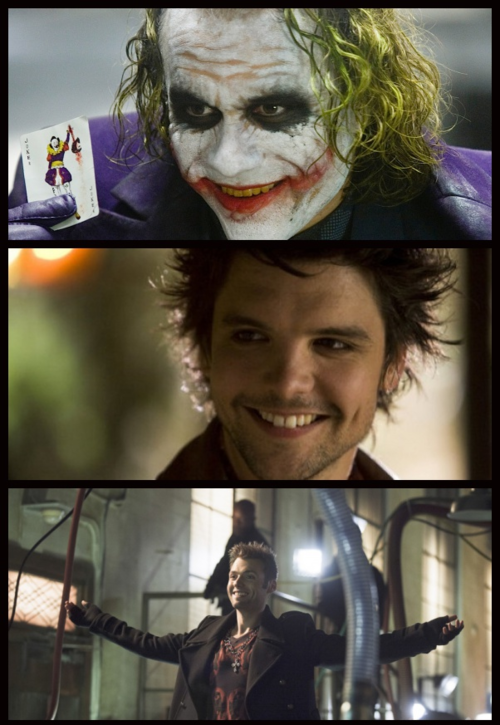Case in point: that terrible episode of X-Men Evolution in which the girls form a vigilante team called the Bayview Sirens. Or the entirety of Captain Planet and the Planeteers. Or Willow’s arc in season six of Buffy the Vampire Slayer.
Sure, this is not always the case. Avatar: The Last Airbender managed to make the girl power message of The Warriors of Kyoshi surprisingly nuanced, and Sonic the Hedgehog or anything in Hayao Miyazaki’s roster of films have a pretty good understanding of how to convey the importance of caring for the environment without hopping on the soapbox.
But as for drugs? Is there ever anything to say about them except they’re bad and addictive and (mostly) illegal? I’m wracking my brains here, but I don’t think any television episode I've ever seen has successfully managed to say anything worthwhile about the drug industry and its devastating effects on people beyond the fact that it’s - you know - really, really bad.
Which is true of course, but like I said – it makes for heavy-handed viewing. And I don’t care how important your message is, a story has to be entertaining before anything else.
 |
| What are the odds that this would actually feature Green Arrow? And how much to you want to bet that this edition is utterly tedious and dull? |
Thankfully, that didn’t happen. Drugs were a plot-point in this episode, not the actual point.
The point was Thea.
Although I’m still waiting for this girl to grow into something other than “damaged little sister”, I concede that at this early stage, she’s of more use to the narrative as someone to spur Oliver into action. Her own personal character growth can come later.
So after she’s tested positive for drug use while driving and threatened by a hard-ass judge as an example to her peers, Oliver’s big brother instincts kick into over-drive. He decides to solve the problem with both his personas: the wealthy young heir who can approach Laurel in order to negotiate a more lenient deal with the judge, and the hooded vigilante going after the drug supplier in order to take some of the heat off Thea.
To get close to him, he goes back to his Russian contacts. I’ve lost track of how exactly these guys fit into the wider context of the show; suffice to say that they can arrange a meeting with the distributor of Vertigo – on one condition. They haul out a tied and gagged man, and sure enough: it’s a case of If You’re So Evil Kill This Guy.
Of course Ollie does it. Of course it’s not for real.
The predictability of the twist and untwist robbed this scene of whatever power it was trying to muster, all the more so because it’s treated so casually in the narrative. Diggle doesn’t raise any sort of protest when Oliver starts (apparently) strangling the guy, and the man is hustled off-stage as soon as the audience is reassured that he’s just unconscious. Not helping was Dig’s line: “I can’t believe you just killed that guy!”
Yeah, it’s so totally weird when people are just killed like that!
My point is that life and death should never be treated this casually. Heck, it’s not treated this casually in real crime syndicates (why on earth would the Russians trust Oliver to dispose of the body? Has Oliver considered the possibility that next time one of these Russians get arrested, they’re going to mention that he killed a man with his bare hands?) And yes, I realize that Green Arrow is a comic book character and that looking for realism on a show about him is futile – except that the show itself strives for a fairly realistic vibe.
Which is exactly what they went for with the cop shoot-out at the end. Oliver doesn’t get away scott-free (as you’d expect) but is recognised and identified by his cop-buddy McKenna Hall, leading to another shouting match with Detective Lance. Yet the consequences of Oliver’s presence at the drug exchange only last sfor a single scene. So we’re straight back to narrative cheating.
Here’s the thing: KNOW YOUR GENRE. Either commit to a hard and gritty atmosphere and its subsequent themes/consequences, or embrace the crazy comic-book logic and let your lead character get away with... well, murder. In the figurative sense.
Because right now, the show is this uneasy blend of narrative convention and moment in which Reality Ensues, and it’s turning out to be its biggest weakness. Applying logic and consequences to some scenarios but completely ignoring them in others is just confusing.
Which brings us to Seth Gabel (who I’m also currently watching as Cotton Mathers on Salem) as the inventor and dealer of Vertigo. Unfortunately he’s been given the name The Count, which brings to mind the Sesame Street character, but Gabel does something that has not yet been done on this show before: plays his character like an actual comic book character.
The Count is like a cross between Heath Ledger’s Joker and Andrew Lee Potts’s Mad Hatter, just as deranged as the former, and with the fashion sense of the latter. Hey, if you’re going to steal, you may as well steal from the best.

Granted, villains are always allowed to be a little more wild than our heroes, but if the rest of this show was shaped around this particular portrayal of a character (flamboyant and larger than life), I think we’d have a better understanding of how much realism the audience should expect.
Miscellaneous Observations:
The island adventures were a little confusing this time around. Ollie is dragged out of his cage, made to fight with Yeo Fei, given the “magical” stranglehold to convince the others of his death and thrown off a cliff. I’m at a loss to understand what exactly these people want with him. Why’d they torture him to find the location of a man they were already in league with? Why play all the mind games if they’re just going to have him killed? Why is Yeo Fei helping him out? I’ll hold out for answers, but it’s getting dangerously convoluted in flashback land.
McKenna Hall was a nice addition to the episode; here’s hoping we see her again.
Wait, did Oliver just walk out of the police station with an official police file?
Though I can see that Thea is deliberately being portrayed as a spoiled little snit (which is better than accidentally being portrayed as a spoiled little snit), a part of me feels that she’s been let off the hook way too easily. Perhaps she should be forced to deal with the consequences of her actions, and not just by doing some office time with Laurel.
Speaking of whom, I really enjoy the rapport that goes on between Laurel and her father. Kate Cassidy’s strongest scenes are the ones opposite Detective Lance, especially with the ghost of Sara hovering around everything they say and do.
Again, I’m left wondering why Oliver goes to Felicity for a task that’s completely outside the realms of her skill base. SHE’S AN I.T. GIRL. How on earth would she know how to analysis serums?
Despite my complaints and a few clichés, this episode wasn’t bad – and since the writers managed to avoid turning it into A Very Special Episode about drug abuse, here’s everyone's favourite PSA to compensate:
No comments:
Post a Comment